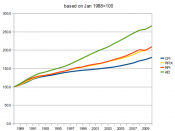IntroductionMicrosoft is one of the most powerful and largest computer software organizations in the world. They have revenues of more than $45 billion on an annual basis. [Source?] It has a monopoly in the operating software industry and provides a wide variety of software and ecommerce services and products. This includes operating systems for personal computers and servers; server applications for client/server environments; business and consumer productivity applications; software development tools; and Internet and intranet software and technologies.
The company has expanded its interactive content efforts, including MSN (the Microsoft Network online service), various Internet-based services, and entertainment and information software programs. Microsoft also sells PC books and input devices, and it researches and develops advanced technologies for future software products.
Environmental AnalysisIf we closely analyze this statement, the patterns of an organization's actions will be clearly reflected not only in the financial performance of an organization over the years but in the relative strengths, weaknesses and strategic positioning of the firm in the business environment, industry or economy it operates in.
The understanding of these elements is the prima facie requirement in the strategic planning and management process and is closely analyzed in the environmental scanning process of an organization. These factors are very important in establishing the corporate level strategies of an organization. But one has to remember that there are numerous other factors also such as the general state of the economy and industry growth rates which influence the formulation of strategy. Thus let us discuss the environmental analysis of Microsoft in detail.
External EnvironmentHere we will analyze the affect [effect] of societal forces and to see what trends are likely to affect Microsoft. The business environment of the new millennium will have to contend with:â¢Turbulent markets that change rapidly and unpredictablyâ¢Highly fragmented 'niche' markets instead of...


